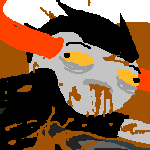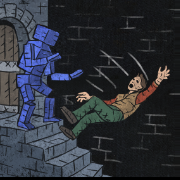|
I don't really get what people find remarkable about the "manipulation" argument. Classifying all attempts to appeal to the audience as manipulating them is hyperbolic, not to mention most of the appeals are pretty basic stuff (vulnerable female has difficulty overcoming problems out of their control). We're so aware of their purpose in narrative these days that we downright expect a few "manipulations" as the principles of good writing and presentation. I suppose Prequel's got a few interesting facets that tug on the heartstrings of the audience more than most. The audience suggestions give the slim hope we can do something to avert each tragedy (realistically we cannot) which only enhances the tragedy. Calling these manipulations, though?
|
|
|
|

|
| # ? May 30, 2024 09:47 |
|
Dolash posted:Calling these manipulations, though? It's just that Kaz likes the idea of manipulating. So he says stuff like this: Kazerad posted:In terms of regular-vs-irregular, Prequel's took its inspiration from the irregular schedule applied by MSPA - in terms of behaviorist reinforcement schedules, it's known as Variable Interval reinforcement. Variable Interval is characterized not only by very frequent responses (people will check the site a whole lot) but for being very difficult to extinct - that is, if people are used to irregular timing, then it will take a pretty big delay before they stop checking. Even if I were capable of producing once/twice-per-week on the dot, I would probably add a day or two of variance just to get this benefit. I don't know if Hussie or Burlew or whoever else you want to compare him with thinks of their update rate as "Variable Interval behaviorist reinforcement"; maybe they actually do. But when queried on the subject, they answer "I just put stuff up as soon as I get it done". Maybe it's because Kaz has a background in social sciences so he can explain the tricks he uses instead of going "I just go with what works for telling a story" like storytellers who went with a more traditional literature background do. But it creates the feeling that the story is manipulative to be manipulative, instead of being manipulative to be an efficient story. And on the subject of update rate, to be honest, Prequel is one of the comics I follow that I never check directly. I let the RSS feed tell me when there is something new instead. Without RSS, I'd have dropped it long ago.
|
|
|
|
Kazerad posted:In terms of regular-vs-irregular, Prequel's took its inspiration from the irregular schedule applied by MSPA - in terms of behaviorist reinforcement schedules, it's known as Variable Interval reinforcement. Variable Interval is characterized not only by very frequent responses (people will check the site a whole lot) but for being very difficult to extinct - that is, if people are used to irregular timing, then it will take a pretty big delay before they stop checking. Even if I were capable of producing once/twice-per-week on the dot, I would probably add a day or two of variance just to get this benefit. I'm really quite surprised that this is that effective in the era of RSS. I'm normally notified of a new Prequel because of this thread, but if I'm not reading it, and with other variant comics, it's all RSS notifications for me. And I would imagine that this would be the solution most people would reach for, especially given that I suspect Prequel's fanbase is more technically inclined than average given the setting. It takes the frustration out of irregular updates.
|
|
|
|
Cat Mattress posted:It's just that Kaz likes the idea of manipulating. So he says stuff like this I wouldn't describe myself as liking the idea of being manipulative; rather, I like the idea of analyzing entertainment/storytelling and trying to figure out how it works. Any attempt to measure it empirically generally leads back to the idea of the entertainer as someone who controls thoughts and behavior - whether it's making someone feel an emotion, participate in a game, or even just turn to the next page without putting the book away. It's done on a small scale with things like colors and composition, and it's done on a larger scale with things like reinforcement schedules, advertising, and branding. I can only play with this stuff for so long before getting really curious how it works, what it can do, and how I can use it even better. And - I guess at the risk of alienating some people - this is something I try to be pretty open about. I believe that studying things and thinking critically about what you do should always be encouraged. And personally, I like to think that one day we might be able to reduce entertainment to a science, and we will be able to make everything extremely entertaining all the time. Then again, if I'm just rambling too much about this and it's boring, tell me and I'll stop  MikeJF posted:I'm really quite surprised that this is that effective in the era of RSS. Kazerad fucked around with this message at 11:42 on Aug 11, 2012 |
|
|
|
Kazerad posted:And personally, I like to think that one day we might be able to reduce entertainment to a science, and we will be able to make everything extremely entertaining all the time. And suddenly I find myself disagreeing with everything you say because of one sentence. Efficiency!  I use RSS because holy drat is it so much easier, I don't need to worry about missing an update or nothing just check the site when I see it's updated the RSS.
|
|
|
|
Whether or not irregularity is intended as some sort of social experiment (or whatever) I just sort of expect that very infrequent and very irregular production of pages is just going to be inherent to the requirements of the comic format, and I accept that as costs of business for the end product we get. (I also prefer the quality and the animation that results on account of it so in a choice between this and Regular Updates, I'll take this).
|
|
|
|
SatansBestBuddy posted:I use RSS because holy drat is it so much easier, I don't need to worry about missing an update or nothing just check the site when I see it's updated the RSS. In hindsight maybe I should start doing this instead of heading straight to the site when I see 10 new posts in the topic.
|
|
|
|
Very frequent updates, I think, make it much easier for a webcomic to get popular. If the reader is rewarded every time they check for an update, then they're that more likely to think well of the act of visiting the site, no matter what the reward schedule.
|
|
|
|
Bongo Bill posted:Very frequent updates, I think, make it much easier for a webcomic to get popular. If the reader is rewarded every time they check for an update, then they're that more likely to think well of the act of visiting the site, no matter what the reward schedule. nah, I for instance haven't checked Darths and Droids (which I enjoy) for weeks or months at a time, but even though I know Homestuck is currently on hiatus I check the front page for updates pretty much every day. Occasional rewards are stronger than constant ones.
|
|
|
|
Pidmon posted:nah, I for instance haven't checked Darths and Droids (which I enjoy) for weeks or months at a time, but even though I know Homestuck is currently on hiatus I check the front page for updates pretty much every day. Occasional rewards are stronger than constant ones. You mean Homestuck, the comic that usually updates multiple times a day, and is currently probably the most popular story-driven webcomic?
|
|
|
|
Bongo Bill posted:You mean Homestuck, the comic that usually updates multiple times a day, and is currently probably the most popular story-driven webcomic? Yes, I mean Homestuck, the comic that has no set schedule and updates completely at random, as an example for a randomly-updating comic.
|
|
|
|
Pidmon posted:Yes, I mean Homestuck, the comic that has no set schedule and updates completely at random, as an example for a randomly-updating comic. I was using it as an example of a frequently-updating one, regardless of the consistency of that frequency.
|
|
|
|
Social Science Sez: Hook 'em with a guaranteed reward for a behavior, then drop the frequency of the reward and make it random, and you've created an addict.
|
|
|
|
I think I mentioned it upthread, but the key with variable interval is that the rewards have to be frequent and irregular to start. The reason this works is that you get in the habit right away of checking for a reward frequently and not being disappointed when the reward doesn't appear, since another reward will be along shortly anyway. After a while, you can gradually stretch out the periods between rewards, since the behavior of checking for a reward and not being disappointed is already conditioned. This schedule has what's called a high resistance to extinction, meaning the conditioning continues for a very long time after the rewards are stopped. This is why Hussie can stop updating for a month and nobody stops checking the site; because the previous irregular/frequent schedule has convinced you that you'll be rewarded if you keep checking (and you will, because Hussie will come back and update unless something happens to him). Hussie (and to an extent Kazerad) are also varying the proportion of the difficulty of getting the reward with the size of the reward itself. So sometimes it's a single panel update with virtually nothing in it, sometimes it's a full flash walkaround where you have to put in significant effort to wrest the story out of it, and sometimes it's a page like Kaz's latest update where you get something awesome almost for nothing. This isn't as big a deal as the schedule as long as the reward is always considered to be sufficient for the effort expended in getting it, but it does have some effect on making people more enthusiastic to check the site. It might be a fifteen-minute flash movie this time! There's also the concept of a variable RATIO schedule. Traditionally, this is done by varying the number of times you have to perform the reinforced behavior before getting a reward. (This doesn't apply to checking the site, since checking the site N times won't produce a result even for very high values of N unless enough time has passed.) You see a better example of this in things like World of Warcraft, where the number of monsters M you have to kill to get some cool item is unknown to you (but you believe you'll get one if you kill enough). You start out with M being small and gradually increase it, and people stick around in the same kind of way. This one produces the strongest response but not necessarily the strongest resistance to extinction. I'm not sure people would accept a webcomic built wholly on this principle, but it's interesting to consider.
|
|
|
|
It also probably doesn't hurt that Hussie has cultivated an audience that is predisposed towards obsessive behavior in general.
DaveWoo fucked around with this message at 18:26 on Aug 14, 2012 |
|
|
|
Bongo Bill posted:You mean Homestuck, the comic that usually updates multiple times a day, and is currently probably the most popular story-driven webcomic? Saying homestuck updates multiple times a day is like saying dilbert updates multiple times a day because it usually has 3 or 4 panels.
|
|
|
|
Normal Adult Human posted:Saying homestuck updates multiple times a day is like saying dilbert updates multiple times a day because it usually has 3 or 4 panels. A lot of the time a day's new panels would come in multiple groups, but holy poo poo do I hate this conversation and regret starting it.
|
|
|
|
SatansBestBuddy posted:
Oh noooo, that is like the worst kind of efficiency! I confess it is perhaps not a widely-held view. Personally, I think in general a more entertaining world is better. Imagine if all teachers understood how to make learning fun, or all workplaces knew how to keep employees engaged, or all game designers understood how to make your purchase worth the money. It's a fun thought - a world where entertainment value is basically taken for granted. While I doubt that this ideal could ever be achieved fully, I think it is something worth aiming for. Because the fact is, a lot of people want entertainment to be better understood. For every reader who is disturbed at the idea of stories being tailored specifically to entertain them, there is someone else who just wants to be entertained as enjoyably as possible. For every person who thinks an artist should work his craft for pure pleasure and with no thought of the audience, there is someone else who is frantically trying to make a living off their writing and can't understand what they are doing wrong. If we can study entertainment and remove the mystery from it, we can one day reach the point where ratings, readership levels, audience engagement, etc are not a gamble, but a choice the creator consciously makes. What he chooses is up to him. But, uh, yeah, hopefully I'll be done making the next pages sometime this week so this thread can move on to something besides me compulsively trying to dissect human behavior. idonotlikepeas posted:There's also the concept of a variable RATIO schedule. Traditionally, this is done by varying the number of times you have to perform the reinforced behavior before getting a reward. (This doesn't apply to checking the site, since checking the site N times won't produce a result even for very high values of N unless enough time has passed.) You see a better example of this in things like World of Warcraft, where the number of monsters M you have to kill to get some cool item is unknown to you (but you believe you'll get one if you kill enough). You start out with M being small and gradually increase it, and people stick around in the same kind of way. This one produces the strongest response but not necessarily the strongest resistance to extinction. I'm not sure people would accept a webcomic built wholly on this principle, but it's interesting to consider. I have ideas.
|
|
|
|
Of course, the best way to find something entertaining is to run an electric current into a certain part of your brain every time you do it. Artistic entertainment is basically a crude, sensory-based version of those little pedals that the rats kept on pushing until they starved to death. With science, we can figure out formulaic ways to do it better than we used to even if we're avoiding cutting into our brains, though.
|
|
|
|
This is fun to bat around and everything but if there's one reason to be anti-science and anti-modern it's the impulse to squeeze the humanity out of every art and culture and replace it with "we are all chemical experiments and the best result is to run a maximally efficient energy current through our brains". That something can be 'reduced to a science' is not always desirable or laudable as a pursuit. Making the world more fun is a noble goal. Making it more fun by slicing fun apart into its constituent atoms so it can be manufactured is kind of weird and diminishes the key elements of self-discovery and development from the human experience. People prefer to be peers in the world of artistic expression rather than subjects in a scientific test. Then again I majored in philosophy and the social scientists never invited us to their pub crawls, so maybe I'm just bitter.
|
|
|
|
Dolash posted:Then again I majored in philosophy and the social scientists never invited us to their pub crawls, so maybe I'm just bitter. Sorry, you were part of the control group, is all.
|
|
|
|
Dolash posted:This is fun to bat around and everything but if there's one reason to be anti-science and anti-modern it's the impulse to squeeze the humanity out of every art and culture and replace it with "we are all chemical experiments and the best result is to run a maximally efficient energy current through our brains". That something can be 'reduced to a science' is not always desirable or laudable as a pursuit. I wouldn't call it "bitter", a lot people would agree with what you are saying. The part I am inclined to disagree with is the idea that approaching art scientifically removes humanity/development from the experience. Wild animals can develop on their own; part of what separates us as humans is our ability to communicate complex ideas to eachother. We can build off eachother's work and move forward as a species rather than as individuals. For instance, there was a time when surviving the winter was a really big deal for most people. We eventually learned enough about agriculture and food storage that it became less of an issue, we developed machines and transportation systems that let us harvest more efficiently and survive even through drought and floods, and today we have even delved into genetic engineering that could perhaps one day let us grow crops in otherwise inhospitable environments. That is exciting! I think art and entertainment are fully capable of progressing down the same path. As we develop a greater understanding of the internal mechanics at play, things that were once challenging can eventually become widely understood. Rather than progressing and developing as individual artists, we can develop together. As with agriculture, it's not as though all mystery is suddenly going to disappear - it would be a slow process of discovery and improvement, and would probably uncover new mysteries along the way. MikeJF posted:Of course, the best way to find something entertaining is to run an electric current into a certain part of your brain every time you do it. Kazerad fucked around with this message at 06:49 on Aug 21, 2012 |
|
|
|
Kazerad, I think that we share a great deal in common in our stances towards the arts, and have even shared similar experiences when sharing our views to the public. Let me explain. About two years ago, I came to the conclusion that comics, as a medium, are a form of linguistic expression, and like a language, are governed by regular systems of grammar, by which strings of pictures in sequence -- like the words of a sentence -- are codified and given meaning, instead of simply being arbitrary images. This led me to conclude that it was possible to codify and consequently write down all the "laws" of comics in the form of abstract expressions of symbolic logic. By doing so, one would totally clarify the mechanics of comics, so to speak, and build foundations for an analytic approach to comic-making. I spent the next two years teaching myself symbolic logic just in order to write my ideas down and prove them deductively. I still haven't finished the writing -- I still need to teach myself more logic! -- but what I have shown to other people has tended to get reactions like "You can't apply math to art!" or "This is scientism!" It seems that people are resistant to applying deductive and scientific methods to the arts. But the main difference, I think, between your dreams and mine, are in their focus. My goal is directed purely at the abstract theory of the field in general. Yours, however, are directed towards people. People do not like to know that they are being manipulated. And the end-goal of your dream, I hope you realize, would be approaching nothing less than a science of human mind-control. It is of course quite nice to want a world in which works can be maximally entertaining, but I hope you do realize that the methods that you outline by which that can be achieved, would, if perfected, would have in them the seed for more harm than good if applied. This, I think, is the germ of most of the reactions against what you describe -- people think "If we had that, there'd be no stopping the greedy and ambitious from enslaving people to their will."
|
|
|
|
The application of reason to the creation of art is hardly as sinister as all that. To a certain extent, that's what the field of criticism itself is - understanding why a story (or whatever) had the effect it did. One might argue about whether the net effect of centuries of this analysis has resulted in a richer culture, but rare indeed is the artist who, given the opportunity to understand their medium and audience better, would decline. Art is fundamentally human, founded on a human's understanding of humans; to reduce it fully to an algorithm first requires quantifying humanity itself, in the process creating a world beyond our ability to predict or judge. And while that is at least a theoretical possibility, it's certainly not going to happen as a result of any artist's personal efforts to better satisfy his audience. So what is even the big deal.
|
|
|
|
Bongo, while it's probably only a theoretical possibility, the mindset that nevertheless pursues it is discomforting to people because it's one that reduces those it makes subjects of. Art criticism and understanding art and culture, these are worthy goals which reason can be applied to. Making a science of something is more than applying reason to it though, it's a whole quantification approach that does reduce the humanity of its subjects somewhat. This isn't as important in, say, physics, where humanity is only tangentially involved, and even biology merely faces up to the reality that we are made of meat, but taking it into art and culture is destructive - the conclusion always seems to lead to the idea that art and culture are inefficient, that if all we're trying to achieve are positive responses we can manage that with a well-managed biology. That's obviously the most extreme version of the view, the reduction to absurdism, but it's also what people think of when you happily inform them that the motive behind a story is to find the most effective levers to pull to produce the desired audience response, like rats in a maze. If the real intent is to produce these desired results, why even tell people that's your intent when it's likely to derail them? If Prequel's audience at large was confronted with the idea that Kazerad is writing the story from the perspective of an intentional emotional manipulation to test their reactions, wouldn't they be less likely to invest in the story and less likely to produce the desired... okay I think I'm getting away from myself here. My initial comment at the top of this page had been after just skimming the thread, it looks like there really is an actual discussion going on here which I hadn't expected. Dolash fucked around with this message at 17:33 on Aug 21, 2012 |
|
|
|
I think this is the best discussion that has ever been had in a thread about a fictional alcoholic cat.
|
|
|
|
This is only making me wish I knew where I kept my Barthes and Sartre books.
|
|
|
|
My oh my, after seeing that last post I pretty much had to congratulate you on your interactive design Kazerad, that's really incredible. The dynamic stuff you've done (and your happiness with the freedom of a personal site upon which to implement it) really makes me want to try my hand at it. Do you plan to do a retrospective of the inner workings of Prequel, when you're finished with the project? As in going into the specifics of why you made certain choices, and what conclusions you've developed based on the experience? I'd imagine that would be a very interesting read.
|
|
|
|
DrSunshine posted:Kazerad, I think that we share a great deal in common in our stances towards the arts, and have even shared similar experiences when sharing our views to the public. Let me explain. Your research actually sounds pretty awesome, I totally hope I get a chance to read it once it is complete. But about the difference, I personally think any potential dangers of a manipulation science are mitigated by the fact that understanding something also increases your awareness of when it is being used against you. When you can consciously recognize that you are being controlled, you have the choice of whether or not to accept it. Some would disagree with me here, but I do not think acknowledging the presence of manipulation detracts from art any more than acknowledging the existence of physics detracts from a gymnastics routine. Most of us just want to see it used to do neat things. Turning a blind eye to the manipulative elements of art - or any form of rhetoric - is perhaps one of the most dangerous things we can do. Some people will figure out how to control it better than others (many already have!), and those people will have the potential to influence major elements of our culture. Without a deeper understanding of art, we will not only lack that influential power ourselves but will lessen our ability to recognize when it is being used on us. Like Dolash said I probably do risk losing a certain level of audience engagement by being open about my mindset, but it's not something I'd really feel right keeping secret. I mean, I could just claim that I'm following my Artistic Muse and making decisions that are just best for the story, but I'm trying to approach this in a more analytic and replicable manner than that and feel like I could contribute more by being open about it. If my ideas and approaches pan out, I want people to be able to imitate or build on them. And if they backfire disastrously, I want people to have a good idea what I was doing when it went wrong. Everdraed posted:My oh my, after seeing that last post I pretty much had to congratulate you on your interactive design Kazerad, that's really incredible. The dynamic stuff you've done (and your happiness with the freedom of a personal site upon which to implement it) really makes me want to try my hand at it.
|
|
|
|
Kazerad posted:But about the difference, I personally think any potential dangers of a manipulation science are mitigated by the fact that understanding something also increases your awareness of when it is being used against you. This reminded me of this, which you might have heard of before since it was all over the net a few years ago, and seems to match your interests.
|
|
|
|
Kazerad posted:For instance, there was a time when surviving the winter was a really big deal for most people. We eventually learned enough about agriculture and food storage that it became less of an issue, we developed machines and transportation systems that let us harvest more efficiently and survive even through drought and floods, and today we have even delved into genetic engineering that could perhaps one day let us grow crops in otherwise inhospitable environments. That is exciting! Hasn't it? My DvD storage sustains me during a creative drought.
|
|
|
|
Where did this thread go? I thought we were supposed to be discussing what Pigtails Katia is going to encounter next.
|
|
|
|
Cat Mattress, I actually haven't seen that particular video! It was really neat. IronSaber posted:Where did this thread go? I thought we were supposed to be discussing what Pigtails Katia is going to encounter next. It accidentally became science ethics and it's mostly my fault Prequel-related, these dream updates are fun to make but I will be happy to go back to copy and pasting sprites afterwards. Somewhere in here I kind of lost touch with the whole "simple silhouette" thing.
|
|
|
|
The simple silhouettes are great for character design, but I'm glad that you've been going beyond the copy-pasted sprite stuff so often, especially since I don't really give much of a poo poo about update speeds. I know you care about reaching wider audiences and all, but as someone who doesn't actively participate in the CYOA aspect, I definitely prefer higher quality over the greater reader participation/interactivity that comes from quick updates. Plus, higher quality makes for better re-reading. lesbian baphomet fucked around with this message at 11:58 on Aug 22, 2012 |
|
|
|
DrSunshine posted:About two years ago, I came to the conclusion that comics, as a medium, are a form of linguistic expression, and like a language, are governed by regular systems of grammar, by which strings of pictures in sequence -- like the words of a sentence -- are codified and given meaning, instead of simply being arbitrary images. This led me to conclude that it was possible to codify and consequently write down all the "laws" of comics in the form of abstract expressions of symbolic logic. By doing so, one would totally clarify the mechanics of comics, so to speak, and build foundations for an analytic approach to comic-making. This is awesome, but I particularly like the irony that something that managed to be inexpressible in your logic system yet still 'work' as a comic would I would imagine be something that I would consider to be artistically superior to something that fit in. Not certainly, but I can see that being the case.
|
|
|
|
MikeJF posted:This is awesome, but I particularly like the irony that something that managed to be inexpressible in your logic system yet still 'work' as a comic would I would imagine be something that I would consider to be artistically superior to something that fit in. Not certainly, but I can see that being the case. Actually Kazerad's latest update pretty much fits that description, since it has no clearly defined panels or anything of that sort. I'd classify it more as an interactive animation than anything, however. My system is merely a way of generalizing what applies to most things considered comics and isn't meant as a way to describe the artistic merits or failings of any given work.
|
|
|
|
MikeJF posted:This is awesome, but I particularly like the irony that something that managed to be inexpressible in your logic system yet still 'work' as a comic would I would imagine be something that I would consider to be artistically superior to something that fit in. Not certainly, but I can see that being the case. Sunshine basically already said this, but the ability to define concrete (if arguably arbitrary) cutoff points to what defines a "comic" is very important for empirical analysis. One of the largest hurdles in the analysis of art is that it is traditionally very resistant to people applying definitions to the mediums. A game designer trying to come up with a theory of what makes gameplay entertaining, for example, is always going to have to deal with someone saying "but that doesn't explain why Citizen Kane was so much fun!". I call Prequel a "comic", but someone trying to study sequential art would require a much more strict definition. This has a very different visual grammar from this simply by virtue of the different mediums. I take a lot of cues from traditional comic panel composition, but at the same time I also apply things I've learned about animation timing. Putting the two ideas together or flipping between them is fun, but there is no reason such things have to be studied together.
|
|
|
|
Man, I feel stupid because I just like a comic about a down-on-her-luck lady just tryin' to do her best. I didn't know that I had to have a triple PhD in entertainment ethics.
|
|
|
|
Kazerad posted:But about the difference, I personally think any potential dangers of a manipulation science are mitigated by the fact that understanding something also increases your awareness of when it is being used against you. Unfortunately, that doesn't really seem to be the case. In behavioral economics, there have been a number of studies about overcoming biases and compensating for misaligned incentives with the application of knowledge thereof. Just gonna put this out short-form: the person trying to compensate nearly always undercompensates. When compensating for a bias of one's own thinking, extra knowledge helped but did not erase the bias. But when that bias was on the part of another... I gotta do an example, I'm having trouble with words. Say you have Person A and Person B. Person B wants to sell Person A a widget at a profit. Person A wants to buy the widget at cost, but does not know the cost. Person B's standard strategy is to inflate the offering price so that bartering can bring it down, thus satisfying A's desire to get a lower price. The two parties barter, and they find a compromise, and let's call that price X. That's the control. In the experiment group (this is drawn from an actual paper I read in an experimental design course), both A and B are conditioned with information that basically states B's strategy: offer a higher price so that putting on a show of bartering still results in a favorable price. A typically barters harder and lowers the price further from the opening offer than in the control group. B typically ramps up the opening price so high that, even after this more-aggressive bartering by A, the sale price is still greater than X, the sale price in the control group. So to make an argument from this, let's draw an analogy to providing entertainment. You guys run off and do your research and you find great and useful things and tell everybody about how their heartstrings get tugged. And everyone is now more enlightened and everyone is on the lookout for media messages that are manipulating their emotions. Everything seems well and good. Knowledge seems to have given people power and resistance to those who would use that same power against them. And then Kazerad Junior comes along, and he knows that we know this. So he writes Prequel II, in which Katia Jr. is now not just depressed, alcoholic, and a little screwed up, she's also a childhood cancer survivor with a younger sibling and a pet she struggles to feed, and she degrades herself with pineapples not because she gets drunk, but because it's the only thing she can do to feed her little sister and Spot, and she is terribly, completely aware of every moment of it. Being drunk would be a relief - then she wouldn't have to remember. And if this seems too extreme, well, in 1952 CBS did not allow Lucille Ball to use the word "pregnant" in broadcasts, despite the plot of "I Love Lucy" revolving around her character getting pregnant as she was herself for several episodes. The episode where she finally gave birth was tuned by 72% of households. In 1980, it took Dallas and the "Who shot J.R.?" plot to hit 76% of viewers. In 1983, it took the finale of M.A.S.H. to hit 77%. And that was the last time anything that wasn't the Super Bowl got 70% viewership. Sure, absolute viewership for many programs has gone up, but that kind of captivation has been getting harder and harder to accomplish. What else has made it into the same leagues since M.A.S.H. besides the Super Bowl? Not much. The finale to Cheers in '93; Michael Jackson's interview with Oprah that same year, in which we finally learned what a loony the King of Pop had been made by his coronation; The Day After, a 1983 TV movie about a fictional NATO-USSR war and nuclear exchange. Oh, and the small part of the 1994 Winter Olympics - the parts where Nancy Kerrigan and Tonya Harding competed in figure skating. Remember how Tonya Harding's ex-husband and bodyguard hired a guy to put Kerrigan out of commission for the U.S. championships and Olympics by bashing her in the knee with a club and then Harding herself helped cover it up. High drama. As time has gone one, capturing mindshare has been getting more and more difficult as techniques of storytelling have developed and more and more competition has sprung up. As soon as the science of entertainment is codified, it becomes an arms race, a tragedy of the commons, a prisoner's dilemma. As soon as one entertainer starts making use of it, everyone else has to, as well, to remain competitive. And ten more and more of the entertainment that gets to us has been pre-culled to be the most effective. Autobiographies read like tabloid coverage of Robert Pattinson's breakup with Kristen Stewart just to sell a handful of copies. And so, eventually, ideas will get drowned out by that which is most suited to being commercially entertaining, whatever that may be. Like, y'know, reality TV or Twilight. Not that the resulting products won't have some value; some might even be very good. But the profit motive and entertainment industry that has subsidized a wide variety of creators will have moved on to specialties, leaving great writers and artists to fight among themselves for the scraps of patronage funding, commissions, Kickstarter, and t-shirt sales. Not that a living can't be made that way, but it seems like a great way to erode a culture.
|
|
|
|

|
| # ? May 30, 2024 09:47 |
|
I think a part of it is that we're existing in a culture that's more interested in, and more capable of, consuming their media a la carte, so to speak. The rise of the internet - especially search technology - has enabled this. A major component of the media economics can be explained by the desire to minimize the effort of deciding what to watch (read, etc.). Prior to the 1980s, minimizing that effort meant watching what everybody else was watching, and that's how you see those 70% ratings and those Gone with the Wind attendance numbers and whatnot. In the interim period, after the internet but before Facebook, minimizing the effort of discovery meant typing in something based on preexisting interests and seeing what came up, or browsing related topics along the path of least resistance, which will lead people farther down fractals of specificity. Information is more discoverable than ever, and that makes mass culture decohere and fragment. (Facebook, or social media in general, increases coherence because what they excel at is not discovery but propagation.) Conveniently, this is happening right at the same time that it's easier than ever for talented amateurs to distribute their work. Creators with highly specific ideas and consumers with highly specific tastes meet each other and everybody ends up reading something they really like, and nobody's really harmed by the fact that the works that manage to get the most eyeballs are trashier than ever. Using a formulaic approach to media creation in order to seek a larger audience often does produce inferior work, because the resolution of the data is so poor that all you can really tell is that certain genres are currently popular. But using a formulaic approach in order to better satisfy an existing audience is quite a different practice, because only under those circumstances is it possible to attain the intimate understanding of what works about it.
|
|
|























